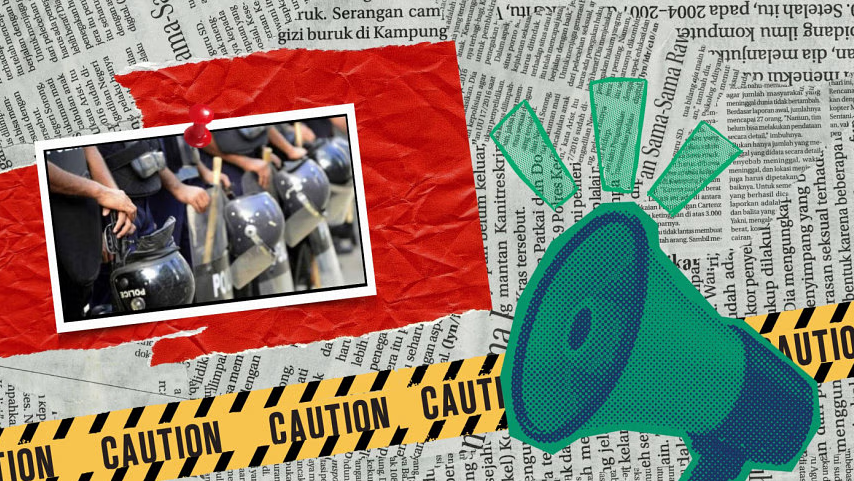Last update on: Sun Jun 23, 2024 08:00 AM
The Bangladesh Police Service Association (BPSA), representing elite officers (BCS cadre) of the law enforcement force, has issued a strong and ominous message to the media. The statement was disturbing, as its tone and tenor appeared to intimidate journalists from reporting on corruption involving any of its members. In an unusually lengthy release (12 paragraphs and over 50 lines), the association did not cite a single report or name to which they objected for being slanderous.
The association’s statement seems to place collective blame on the media, claiming, “Partial, motivated, and indiscriminate reports about former and serving members of the Bangladesh police are being published serially in the news media (print and electronic) and on social media.”
While the association has every right to protest what it calls a “smear campaign” against its members, it did not name any alleged victims of defamation, making it difficult to justify accusing any media outlet of “publishing offensive and negative news reports” out of “personal vengeance and self-interests, which goes against journalistic ethics.” Furthermore, the association issued an advisory to journalists, asking them to exercise caution and maintain journalistic principles when reporting on the police.
In recent weeks, the stories that shocked the nation involved alleged grand corruption and abuse of office by two top officials: former Inspector General Benazir Ahmed and former Commissioner of Dhaka Metropolitan Police (DMP) Mohammad Asaduzzaman Miah. Apart from these two retired top cops, there have been no major graft allegations against any serving officers in recent days, though this does not imply the force is corruption-free. Many would argue that reporting corruption against any in service official carries too much risks for journalists as individuals and the survival of their organisation.
This raises the question of why the association felt compelled to defend its former members. Has the current leadership of the organisation transformed it into a welfare association for retired police officers? Or is this a preemptive attempt by the BPSA to prevent the media from investigating some of its members who may have assisted their top boss in their alleged criminal enterprises, including providing police protection for land grabbing, as alleged by some members of the minority community in Gopalganj?
The BPSA release claimed that the police have always maintained a policy of “zero tolerance” against corruption, stating that if allegations of corruption are proven against any member, both departmental and legal actions are taken. However, had the BPSA leadership reviewed some of the speeches by former IGP Benazir, they might have refrained from using the term “zero tolerance.” On June 16, 2022, he warned his force that those seeking to become wealthy through illegal means had no place in the police force. However, based on the court’s seizure order, we now know that by the time Benazir made that speech, his list of real estate properties was extensive.
It’s frustrating to hear the tedious argument that the police’s departmental disciplinary procedure deals with all kinds of misconduct, including corruption. Who would believe that the force chief can be investigated by his subordinates freely and fearlessly? Numerous human rights groups have made allegations against him for commanding grave violations of human rights, which led to sanctions against him. Has there ever been any investigation into those charges?
Consider the Dhaka Boat Club incident, where actress Porimoni alleged rape attempts by one of the club executives. Subsequent investigations revealed that its founder president was then IGP Benazir Ahmed, and the club was set up on encroached and illegally filled-in portions of the Turag river. This issue was raised in the Jatiya Sangsad on June 16, 2021, by an opposition MP and was not contested by the treasury bench. Neither the Police Headquarters nor the home ministry investigated these allegations.
The BPSA’s warning to the media is particularly concerning given the overall media environment in the country, which is intimidating and lacks meaningful freedom to hold power to account. On June 1, Mahfuz Anam, president of the Editors Council and editor of this daily, stated at a meeting in Dhaka that, “Benazir’s case is a startling example where we, in the media, knew all these things. But we didn’t dare to publish them.” He noted that as the head of a powerful law enforcement institution, Benazir could have punished a journalist for reporting his corruption, and the government likely wouldn’t have protected the media.
It is also worrying that some senior ministers have already deployed deflection tactics, claiming that certain quarters are trying to discredit the government by labelling “all as corrupt”. This appears to be a desperate attempt to distance the ruling party from such corruption. Otherwise, why would someone give a clean chit to the former DMP commissioner before any investigation into his alleged conduct in office? We don’t know whether the ministers’ statements and the BPSA statement are synchronised, but neither is helpful for uncovering the truth through a credible investigation.
Kamal Ahmed is an independent journalist. His X handle is @ahmedka1
Views expressed in this article are the author’s own.

